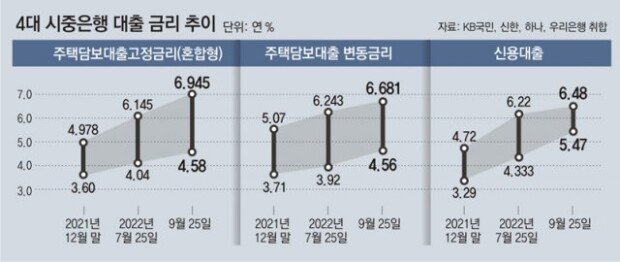Mortgage rates likely to surpass 7% soon
Mortgage rates likely to surpass 7% soon
Posted September. 26, 2022 07:38,
Updated September. 26, 2022 07:38


The mortgage rates of commercial banks are likely to surpass seven percent per year due to the impact of three consecutive ‘giant steps,’ which refer to over 0.75 percentage point increase in the base rate, taken by the Federal Reserve (Fed).
As a high level of austerity measures is expected to continue, including the Bank of Korea taking a big step (over 0.5 percentage point increase of base rate) next month, some forecast that mortgage rates will reach eight percent for the first time in 14 years at the end of this year. An additional base rate rise of one percentage point by the end of the year will add over 13 trillion won of annual interests to be paid by households.
According to the financial sector on Sunday, the fixed mortgage rates of four major commercial banks – Kookmin Bank, Shinhan Bank, KEB Hana Bank, and Woori Bank – range between 4.58 to 6.945 percent. The top of the range is 0.8 percentage points higher compared to July 25. It is the result of the five-year bank debenture rate rise, which is the base of the fixed mortgage rates, from 3.631 percent to 4.795 percent.
The fixed mortgage rates surpassed seven percent in mid-June and fell to the low six percent range as a result of banks’ interest rate reduction and a decrease in bond interest rates. However, as the bank debenture rate sharply rose due to the U.S.’ austerity measures, the mortgage rates will likely exceed seven percent again.
Banks expect that mortgage rates can exceed eight percent at the end of the year. As the Fed implied the fourth giant step, the Bank of Korea is also likely to take an aggressive measure to raise its interest rate at the two remaining meetings of the Monetary Policy Board this year. “If the highest mortgage rates exceed eight percent this year, it would be for the first time in 14 years since 2008,” said a bank employee. “It’s not unlikely given the current prices and exchange rates.”
The interest burden of borrowers will significantly increase since about 78.1 percent of the household loan balance from banks has variable interest rates, which means they are directly affected by changes in interest rates. Assuming that a similar share of household loans from the overall financial sector has variable interest rates, a 0.25 percentage point increase in base rate will add 3.4323 trillion won to the interest burden. If the base rate rises one percentage point until the end of the year, it will increase households’ interest burden by 13.7292 trillion won.
jhshin93@donga.com






![연금 개시 가능해지면 年 1만 원은 꼭 인출하세요[은퇴 레시피]](https://dimg.donga.com/c/138/175/90/1/wps/NEWS/IMAGE/2026/02/20/133390850.4.jpg)
